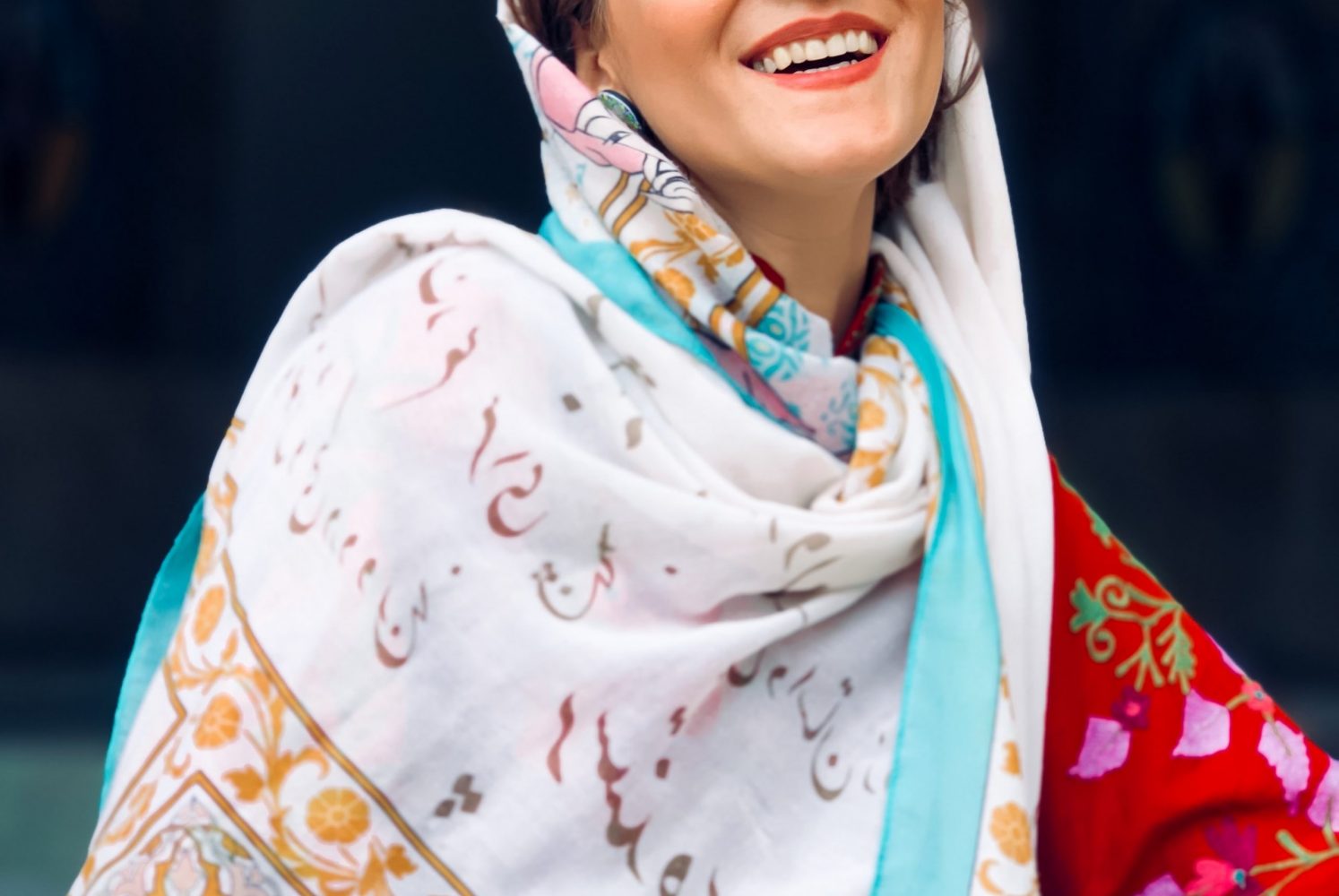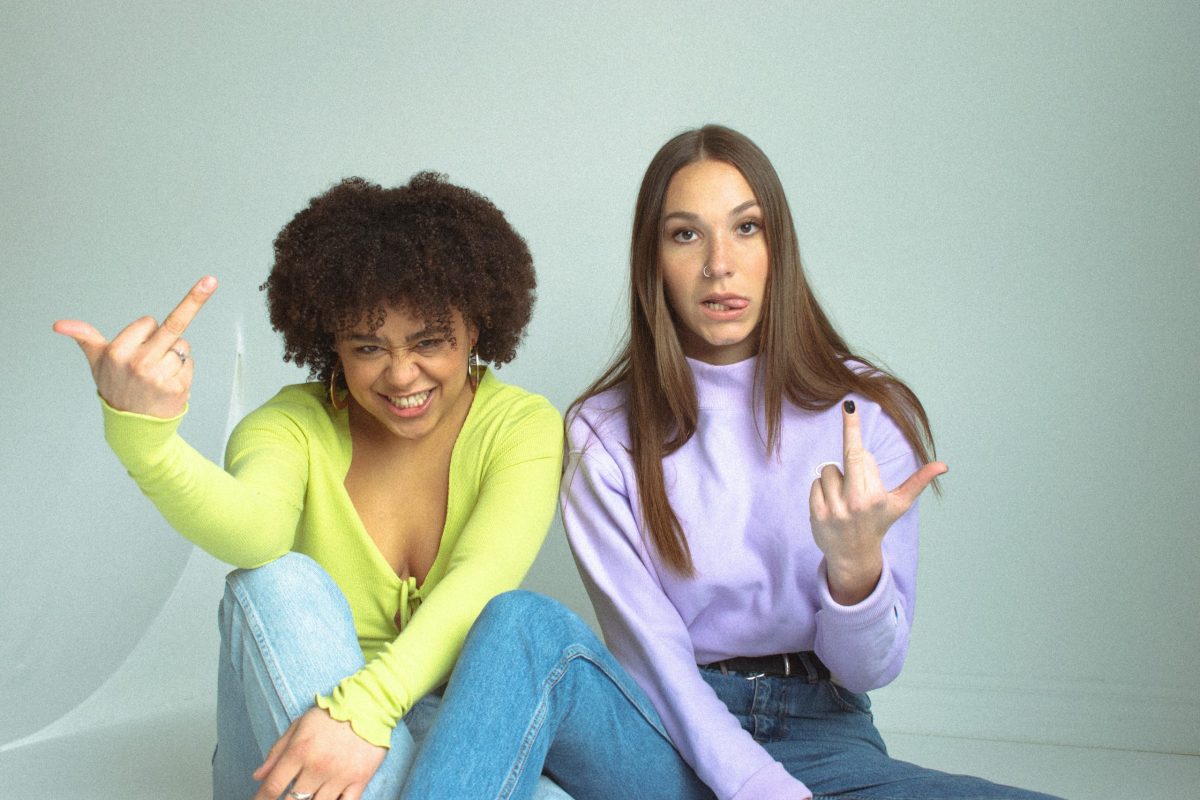interviews
A Road Trip Across America to Dismantle White Patriarchy
Randa Jarrar, author of “Love Is An Ex-Country,” on body autonomy and the problem with white feminism

Randa Jarrar’s memoir Love Is An Ex-Country focuses predominantly on the years leading to the 2016 election, a period, which, like now, was characterized by heightened Islamophobia, misogyny, homophobia, anti-immigrant sentiment, and racism. Jarrar embarks on a road trip inspired by Tahia Carioca, an Egyptian actress who married a white man 20 years before Loving v. Virginia. Like Carioca, Jarrar is privileged and light skinned. However, despite being white passing and privileged, Jarrar is frequently exposed to casual racism and dehumanization, as an Arab American of Egyptian and Palestinian descent, as a fat queer woman. As Jarrar travels across the country and around the globe, she meditates on joy, sexism, violence, single motherhood, surveillance, and kink, through the perspective of a body reclaimed through art.
Recipient of numerous grants and fellowships, including a Creative Capital Award, Jarrar is also a director and a performer who is currently writing a feature film. She also is the author of the novel A Map of Home and the story collection Him, Me, Muhammed Ali.
Jarrar’s work has appeared in the New York Times, Salon, Bitch, and elsewhere. We spoke about misogyny and surveillance, badass Egyptian feminists, and how to remake society.
Deirdre Sugiuchi: Can you discuss the urgency of addressing dehumanization, casual racism, and erasure of Arab Americans and people of color?
Randa Jarrar: Honestly, it’s gotten to the point now where people of color and marginalized communities are constantly asking for white supremacy to stop asserting itself in everything, when the only people who are going to be able to do that are white people. I think this year—the pandemic, the BLM uprisings—they’ve shown us that the world right now is not working for human beings.
There’s this idea that we can pick and choose when we as a larger culture stick up for people or to not erase people. We should all be treated with dignity, with respect.
There’s this idea that we can pick and choose when we as a larger culture stick up for people or to not erase people or to not dehumanize people. We should all be treated with dignity, with respect.
With Arab Americans, even inside this conversation, we tend to be invisibilized because we are West Asian and we are North Africa, so Arab is just a catch-all phrase. It indicates a culture and a language, but it doesn’t encompass everyone from the region. It’s a constant erasure. Just stop anyone on the street and ask them what an Arab American is, and chances are they’ll be “like a Saudi Arabian.” There is just a complete willful ignorance about it.
DS: You wrote that “the main problem with Palestinians is that they continue to exist.” Since we spoke, full-scale hostilities have erupted between Israel and Palestine. Israeli forces have killed more than 200 Palestinians, including over 60 children, using weapons such as precision-guided missiles. Recently the Biden administration notified Congress of its intention to provide $735 million worth of precision-guided weapons to Israel, which has received more money in U.S. foreign assistance than any other country since WWII, with the U.S. pledging to provide $38 billion in military aid from 2019 to 2028.
How have you responded to the current conflict? How should those who are concerned respond?
RJ: I’ve responded by grieving, resisting, and weeping. Those who are concerned should do the following: make a public commitment to the Boycott, Divestment, and Sanction movement, call on their institutions, representatives, and governments to end their support for and place sanctions on Israel, pressure the U.S. government to withdraw aid to Israel, hold protests in solidarity with Palestinians, and join the prison and police abolition movement.
DS: You became a mother at an early age, yet you became this person, one who writes, “I write what I like. And say what I like. And fuck whomever I like.”Can you talk about becoming this? Please. Tell me how you did it.
RJ: Growing up, I saw women being doctors, being mothers, being housewives, being every single thing under the sun, because in the Middle East in the ’80s, the late ’70s, women were multi-faceted, owning businesses or just staying home and taking care of five kids. There were so many different types of ways of being a woman, but there was also a highly restrictive and shaming climate around women, where men were just free to do so much, and women’s sexualities were hyper-policed.
In general, in academia, if you do take a class with a man, it’s liable to be a cisgender white man. Stay away from those. Find strong women to mentor you.
I was really obsessed with growing up and getting to live whatever life I wanted to live, and noticing the ways that being sassy got me into trouble, but also infuriated people, which meant I was doing something right. If everyone was pissed, maybe I’m hitting a nerve or something. But also being nerdy and constantly going to school, so avoiding 9-5, and applying to as many grants, scholarships, fellowships and graduate programs constantly. The university is a huge financial structure you can draw from.
I never had a male creative writing teacher until after I wrote my first book. I got one to get my MFA course. I think if I had had male creative writing teachers as a young person, I don’t know if I would be who I am because the criticism was so unkind when I did have white, male straight professors; they were just cruel in their evisceration of their students’ work, not just mine. Not that there aren’t amazing queer male writers or trans men professors or stuff like that, but in general, in academia, if you do take a class with a man, it’s liable to be a cisgender white man. Stay away from those. Find strong women to mentor you.
DS: One of the ways you explore patriarchal culture is through the lens of the family. You wrote, “My parents were obsessed with me.” They loved you but they felt they owned your body. They were abusive. Your neighbors witnessed the abuse, and did nothing.
However, later, as an adult, you’re at this conference, and the panelists are discussing feminism, and your friend has to say, “It’s not Western to want to be treated equally, to want full rights to our bodies.”
Why do we have to say this over and over? Can you go into this?
RJ: Nawal El Saadawi passed away. She was a bad-ass Egyptian feminist. One of the videos that people have been circulating is of her talking about how feminism was not invented by American women or Western women in general.
There are so many people willing to discredit you on all sides, people from the global South who want to hold on to patriarchy, who will say, “Oh, you’re just copying white folks and their idea of feminism.” Then white men will say, “Well you’re from an oppressive culture.” There’s always a critique of the other rather than taking responsibility to dismantle patriarchy itself.
The same thing ends up happening with white feminists. I was at this conversation between Roxane Gay and Erica Jong. I asked, “When will white feminism understand that it doesn’t include and it actively harms women of color?” and Erica Jong lost her shit. She just put her foot in her mouth. Mari Noemi made a cartoon about this for Electric Lit.
Any time the oppressed are like, “This thing is mine, stop trying to take it from me,” the other side, the oppressor, is going to be like, “What are you talking about?” There’s an unwillingness to let go of power.
DS: And to recognize the abuses of power. Do you know Mona Eltahawy’s work?
RJ: I love her work. I love the way that she talks about patriarchy. She was in our audience, where the guy was basically saying, “This is Western feminism.”
DS: I was raised in white Evangelical culture. Mona Eltahawy’s books caused me to recognize the similarities between how women are policed in Eastern and Western cultures. It drives me crazy listening to white evangelicals objectify Islam or their alleged abuse of women, because white evangelicals are just as abusive.
RJ: And also as a Palestinian, knowing how harmful Christianity is to my people… That Palestinian Jews, Palestinian Christians, and Palestinian Muslims haven’t gotten together and been like, “Fuck you guys, let us live and peace and stop trying to colonize us, mainly because you think Jesus is going to come back and we’re all going to go to hell except for you.”
DS: You write about fatphobia and policing and women. You describe how policing women’s bodies has been normalized, along with police brutality, military rule, dictatorships, ceaseless presidential terms, corruption, job and housing discrimination, criminalization of premarital sex, and dominance of patriarchal and white supremacist beauty ideals. You’re referring to the Middle East, but you could be talking about America. Where do you see us in the U.S. going from here, in regards to body policing in this culture?
RJ: The first thing we have to do in America as a culture is recognize that we are a sex negative culture, that we have a rape culture. We need to talk more about consent. We need to talk more about our bodies. How do our bodies work? Having a sex ed class is not going to cut it. We need to, from the very beginning, talk about consent with kids.
Because we don’t really have the tools, we don’t really know how to get people to take responsibility for their own bodies and their own actions. We’re also inundated by images of sexual violence and violence. In so many different ways, we need to have a cultural shift, admitting that our culture is sex negative, instead of saying, “No, other cultures are very prudish or sex negative. Ours is advanced.”
Our culture is very Puritanical. It’s harmful to men and women, to non-binary folks.
The way things are right now are not sustainable. There are people in power who don’t want women to have control over their bodies because they think that women having access to safe abortions is immoral or unethical or against the word of God.
DS: It’s normalized to police a woman just because she’s a woman, right?
RJ: Absolutely, because we don’t see the women’s bodies as independent but as part of the bigger community, the family. We also police what a woman’s body should look like and be, which is why there’s so much transphobia, just people who are very intent on the fact that biological sex or assigned sex is the only one that matters. That’s not how gender works.
We are constantly at a time where we have to remind each other, ‘This has happened before. It didn’t work. Who is this benefiting?’
How amazing would it be if all of us in America went through a re-education about our bodies, about how to take care of ourselves, about what gender actually is, and how it’s separate from assigned sex. Really understanding what race is and what our history actually is. What if we could just start over, and if it could all just be free?
Then you would have bodily autonomy. We would have to start talking about the police. We would have to start talking about medical apartheid. We would have to start talking about education, who gets to be “educated.” Fat people, Black people, and Latinos are dying at a high rate. Why is that?
But then there are people who are so threatened by this because their whole thing is like, “No, America is the best country in the world, and you accept that Jesus is it, and that this country is the best, or you’re a terrorist. If you don’t like it here, just leave.”
And it’s like, “No, actually, we have bases in so many countries, we’re the ones who are constantly expanding and who should be leaving places.” It’s not the people who are here that need to leave, but the people here critiquing who we all need to be listening to in order to grow. If we don’t grow and adapt as a society, as a culture, as a country, we’re not going to make it.
DS: Your book concludes in the aftermath of the 2016 election. What suggestions do you have for American society at this moment?
RJ: Before Trump, before Obama, we had eight years of Bush. I don’t think we reckoned with those years at all. We need to continue looking back and seeing the ways that we historically make these mistakes. If we’re not going to be honest about how it happens and what we lost, the ways that we have and continue to harm others with our American project, I don’t think that we’re going to be able to grow from here.
A big part of my book is about the amnesia of America. We are constantly at a time where we have to remind each other, “This has happened before. It didn’t work. Who is this benefiting?”
We can’t individually make change. We have to make it as a community.









